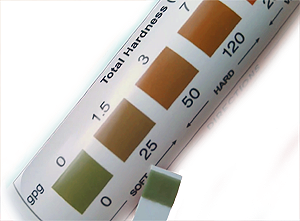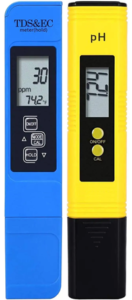Water Testing
Do we need to test your water?
Most customers appreciate how it is important to us to take a moment to define the best course of action toward solving their water quality problem.
There can be a lot of different ways to improve water quality and the best approach for your project can depend on the specific water problems that you are facing and your needs.
Once any problems and your goals have been defined, steps to treating your water can be taken quickly and effectively.
The Complete Pure team can help you every step of the way.
How can we know your water quality problems so Complete Pure products can treat them?
Step 1: Define any likely contaminates.
When you want to improve your water quality, the first step is to learn more about your water source and what kind of water quality problems may be and are known to be present. This will help with defining the best strategy for treating your water and making it reliably pure.
Step 2. Review the report from your city or other water provider.
Although many customers rely on a private water well as their water source, of course, most customers pay for water utility services from a city, municipality, coop, or other type of provider for the water they need.
Each year, by the first of July, most homes and businesses receive a short consumer confidence report or drinking water quality report from their city water department or other type of water utility services supplier. The water report should tell you where your water comes from and what’s in it.
Your Complete Pure technician can check with your city about the quality of your drinking water for you. We’re here to help.
If you rely on a private well or other private water source, investing in water testing results from a certified laboratory is the recommended approach. See below for more information about certified water testing laboratories or contact us today.
Step 3: How hard is your water?
Water hardness is a measure of the amount of minerals in the water. Hard water contains more minerals than soft or purified drinking water.
Some reports from water services utility providers include facts about water hardness. If yours doesn’t, you can call your local water municipality and they should be able to tell you what hardness level their water measure is.
Of course, you can test for water hardness at your location on your own.
One type of basic hard water testing kit includes test strips and a color chart. You can purchase a test kit from a home improvement store or buy a basic water test kit from us.
Another tool commonly used for testing water relies upon a device called a TDS meter.
What is a TDS meter and do you really need one?
The term “total dissolved solids” (TDS) refers to everything dissolved in water, including minerals, salts, and other substances. TDS is measured in parts per million (ppm). The higher the TDS level, the more dissolved solids there are in the water. TDS is a measure of the combined content of all inorganic and organic substances present in a liquid, in molecular, ionized, or micro-granular (colloidal sol) suspended form. 
A TDS meter is a tool that can be used to measure the amount of total dissolved solids (TDS) in a given water sample. A person can somewhat estimate the hardness of water by taking the TDS level and dividing it by 10.
While a TDS meter is not the most accurate measure of water hardness and it cannot identify specific contaminants, it can give you some insights into the quality of your water and help you track any important changes. For example, if you notice a sudden increase in your source water’s TDS levels, it could be an indication that there is a problem with your water supply, such as a broken pipe or contamination. If you notice changes in your treated water, there may be a need to for filter changes, equipment maintenance, or systems calibration.
If you’re concerned about the quality of your tap water, the best way to know for sure is to have it tested by a certified lab.
Should I Have My Water Tested By a Certified Laboratory?
We can help you determine whether or not to have your water tested and, if so, suggest which tests would be most appropriate for your situation.
If you purchase water utility services from a public or other type of organized water provider like a municipality or cooperative, your water will be monitored, tested and the results reported to the federal, state or tribal drinking water agencies responsible for making sure it meets the National Primary Drinking Water Regulations. Your water company must notify you when contaminants are in the water they provide that may cause illness or other problems. You will also receive an annual water quality report, also known as a Consumer Confidence Report, which will contain information on contaminants found, possible health effects, and the water’s source.
If you want to be sure your drinking water is safe, you can have it tested. For example, if a water provider were to announce an emergency involving contaminants or if you’re concerned about lead in your drinking water, the best way to find out for sure if your water is safe or if lead is in your drinking water is to test it.
Contaminants like lead can also be present in plumbing materials and water service lines but the only way to know, for sure, if contaminants are present in your drinking water, is to test. Once identified, there are filters or other types of water treatment system components that can remove practically any contaminant including but not limited to lead from drinking water.
Private well owners are responsible for the safety of their water. If your drinking water does not come from a public water system or you get your drinking water from a household well, you are responsible for making sure it is safe. This means that you should test it regularly for common contaminants. Even if your water is currently pure and safe, testing it regularly can be helpful because it establishes a record of water quality. This record can be useful if there are any future problems or if someone damages your water supply.
The United States Environmental Protection Agency (EPA) estimates that more than 23 million households in the United States rely on private wells for drinking water. The EPA does not regulate private wells or provide recommended criteria or standards for individual wells. However, the EPA does offer information about the importance of testing private wells and guidance on technologies that may be used to treat or remove contaminants.
The EPA and your Complete Pure representative can help you with the information you need about wells, groundwater, and how to protect your health and the health of your family.
Do you know who can test your water?
Who can you contact to test your water? Many county health departments will test your water for bacteria or nitrates. If not, you can find information on locating a state certified laboratory below.
See more information about Certified Laboratory Water Testing.
See more information about Collecting water samples.
